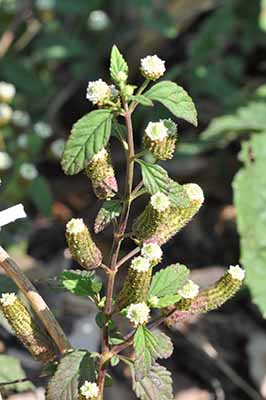Phyla dulcis


| ENG | Aztec sweet herb, bushy lippia |
| SK | lípia sladká, aztécky cukor |
| CZ | lípie sladká, aztécký cukr |
| PL | Lippia krzaczasta, Słodkie ziele Azteków |
| HU |
Taxonomic characteristic
Order: Lamiales, Farmily: Verbenaceae, Genus: Phyla
Using
This plant has historically been used as a natural sweetener (or ,as a home sweetener for herbal tea) and like medicinal herb (to treat bronchitis and indigestion).
The sweet taste is caused by a sesquiterpene compound called hernandulcin, which was discovered in 1985 and named for Francisco Hernández, the Spanish physician who first described the plant in the sixteenth century. Sweet leaves herb of Lippia dulcis, also contain camphor which has a bitter taste and is toxic in large doses to the nervous system especially in children and small animals.
The leaves are harvested as and when required. They are used in its fresh or dried form.
Botanical charakteristic
Phyla dulcis is a species of perennial herb that is native to southern Mexico, the Caribbean (Cuba, Hispaniola, and Puerto Rico), Central America, Colombia, and Venezuela. It is known by several common names, including Aztec sweet herb, bushy lippia, honeyherb, hierba dulce, and tzopelic-xihuitl (Nahuatl).
Phyla dulcis can reach a height of 4–6 meters. The leaves are 1–4 cm long. This plant is generally cultivated in well-drained soil with a pH range between 6.0 and 8.0. The dark green, egg-shaped leaves may turn brown-purple in bright sun and have a dark crimson stem. The flowers are white, oblong-shaped, 2–4 mm long, produced in erect spikes.
Why to have the plant in your garden:
The herb is a low creeper that grows fast and is relatively hardy once it has settled. The leaves and stalks can be eaten like a candy owing to its natural sweetening ingredient. It is used in fruit salads and other culinary recipes, being a natural sweetener.
Text:
Ing. Ján Farkaš, SUA, Nitra, Slovak Republic
Photo:
Dr. Ján Mezey, SUA, Nitra, Slovak Republic
Links to scientific articles
http://www.inaturalist.org/taxa/291974-Phyla-dulcis

